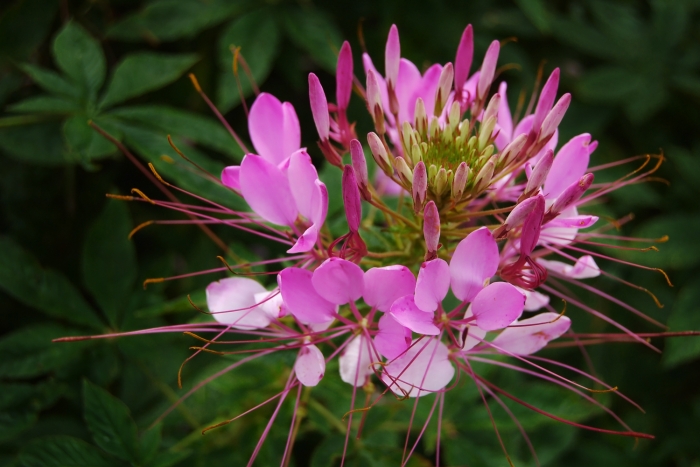Spider Flower
(Cleome houtteana)
Spider Flower (Cleome houtteana)
/
/

NotAnonymous
CC BY-SA 3.0
Image By:
NotAnonymous
Recorded By:
Copyright:
CC BY-SA 3.0
Copyright Notice:
Photo by: NotAnonymous | License Type: CC BY-SA 3.0 | License URL: https://creativecommons.org/licenses/by-sa/3.0 | Uploader: NotAnonymous | Publisher: Wikimedia Commons | Title: Cleome-hassleriana-pink.jpg | Notes: * Description: '''''Acinos alpinus''''' * Picture taken by [[User:Tigerente]] * Habitat: Dörflmoaralm, Upper Austria, Austria * Date: 11. June 2005 {{GFDL}} |






















































Estimated Native Range
Summary
Cleome houtteana, commonly known as Spider Flower, Spider Plant, Pink Queen, or Grandfather’s Whiskers, is an annual herb native to South America, particularly Argentina, Paraguay, Uruguay, and southeast Brazil. It thrives in open areas with plenty of sunlight, such as grasslands and edges of forests. The plant typically grows to a height of 150 cm (60 in), with spirally arranged, palmate leaves that can resemble cannabis, leading to occasional misidentification. The showy flowers, which bloom from late spring to early fall, are composed of four petals and six long, protruding stamens, and come in shades of purple, pink, or white. The blooms are fragrant and are sometimes likened to citronella.
Spider Flower is valued for its ornamental qualities, including its vibrant flowers and unique form, which add interest to garden borders and beds. It is also used as a nectar source for pollinators. The cultivar ’Helen Campbell’ has been recognized for its garden performance with the Royal Horticultural Society’s Award of Garden Merit. For successful cultivation, Spider Flower requires full sun exposure, consistent moisture with well-drained soil, and can tolerate a range of soil types. It is relatively easy to maintain but may need support due to its height. While generally pest-free, it can be susceptible to spider mites and whiteflies. It is not known to be invasive but can self-seed prolifically if conditions are favorable.CC BY-SA 4.0
Spider Flower is valued for its ornamental qualities, including its vibrant flowers and unique form, which add interest to garden borders and beds. It is also used as a nectar source for pollinators. The cultivar ’Helen Campbell’ has been recognized for its garden performance with the Royal Horticultural Society’s Award of Garden Merit. For successful cultivation, Spider Flower requires full sun exposure, consistent moisture with well-drained soil, and can tolerate a range of soil types. It is relatively easy to maintain but may need support due to its height. While generally pest-free, it can be susceptible to spider mites and whiteflies. It is not known to be invasive but can self-seed prolifically if conditions are favorable.CC BY-SA 4.0
Plant Description
- Plant Type: Herb, Subshrub
- Height: 2-4 feet
- Width: 1-2 feet
- Growth Rate: Moderate
- Flower Color: Pink, Purple, White
- Flowering Season: Summer, Fall
- Leaf Retention:
Growth Requirements
- Sun: Full Sun
- Water: Medium
- Drainage: Medium
Common Uses
Bee Garden, Bird Garden, Border Plant, Butterfly Garden, Deer Resistant, Drought Tolerant, Hummingbird Garden, Low Maintenance, Rabbit Resistant, Showy Flowers
Natural Habitat
Native to South America, particularly Argentina, Paraguay, Uruguay, and southeast Brazil
Other Names
Common Names: Spider Flower, Spider Plant, Grandfather’s Whiskers
Scientific Names: , Cleome houtteana,
GBIF Accepted Name: Cleome houtteana Raf.